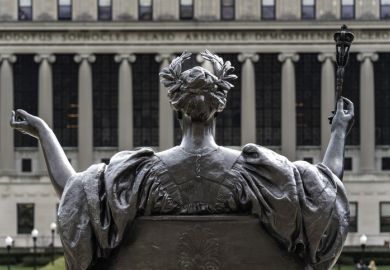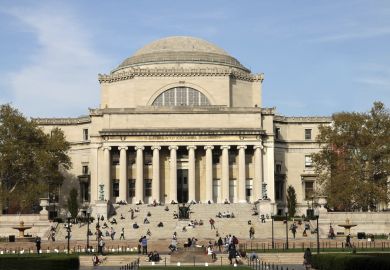More than 100 American colleges and universities house Confucius Institutes, centres of Chinese language and cultural teaching funded and staffed in part with instructors screened by a Chinese government-affiliated entity known as Hanban.
The Confucius Institutes may seem to many to be benign outposts offering cultural events programming and non-credit courses in introductory Chinese, calligraphy or Tai Chi, but for nearly as long as the Confucius Institutes have been around – more than 10 years now – they’ve been controversial.
Advocates for the institutes say they’ve brought welcome new resources for Chinese language study and study abroad at a time when financial support for the humanities has been shrinking, while critics question whether American universities sacrifice some degree of academic freedom and autonomy in hosting the Chinese government-backed institutes, which in some cases are involved in delivering for-credit classes. Many Confucius Institutes are also involved in teaching or teacher training for local schools.
One US-based Confucius Institute, at the University of Chicago, closed in 2014 after more than 100 faculty signed a petition that cited, among other things, concerns that Hanban's role in the hiring and training of teachers “subjects the university’s academic programme to the political constraints on free speech and belief that are specific to the People’s Republic of China.” Ontario's McMaster University closed its Confucius Institute a year earlier after a former instructor filed a complaint alleging that the university was “giving legitimisation to discrimination” because her contract with Hanban prohibited her participation in the spiritual practice Falun Gong.
The latest take on this contentious topic, a 183-page report on Confucius Institutes from the National Association of Scholars, by the author’s account finds “few smoking guns, and no evidence of outright policies banning certain topics from discussion” – but reasons for concern nonetheless.
The report, which examines hiring policies, course offerings and textbooks, funding structures, academic freedom protections, and what the author describes as “formal and informal speech codes” at 12 Confucius Institutes in New Jersey and New York, concludes that “to a large extent, universities have made improper concessions that jeopardise academic freedom and institutional autonomy. Sometimes these concessions are official and in writing; more often they operate as implicit policies.”
The report from NAS recommends that universities close their Confucius Institutes. “Confucius Institutes permit an agency of a foreign government to have access to university courses, and on principle that is a university function,” Rachelle Peterson, the author of the report, said. “Institutions should have full control over who they hire, over what they teach, and Confucius Institutes basically act like class-in-a-box kits that come ready-made for universities to use.”
Short of closing the institutes – NAS’s primary recommendation – the report makes a series of recommendations for changes that faculty and administrators should push for. Those recommendations include: increased transparency and public disclosure of contractual and funding agreements, and the renegotiation of contracts “to remove constraints against ‘tarnishing the reputation’ of the Hanban” and “to clarify that legal disputes should be settled only in the jurisdiction of the host institution (in our cases, American courts).”
Other recommendations in the report call on universities to “cease outsourcing for-credit courses to the Hanban,” to “formally ask the Hanban if its hiring process complies with American non-discrimination policies,” and to “require that all Confucius Institutes offer at least one public lecture or class each year on topics that are important to Chinese history but are currently neglected, such as the Tiananmen Square protests or the Dalai Lama’s views on Tibet.”
NAS, which promotes liberal arts-style education and intellectual freedom, is perceived in higher education as something of a contrarian scholarly organisation with a politically conservative bent, though the organisation maintains it has no partisan affiliation. Much of the prior criticism of the institutes has come from scholars associated with the left.
One theme of the NAS report is the lack of transparency on the part of the universities in the sample. Although NAS’s researcher obtained contracts through Freedom of Information Act requests for eight public universities in her sample – as well as an unsigned draft contract shared by one private university – Ms Peterson found what she called “significant resistance” on the part of many university officials to answer questions about their Confucius Institutes. She reported that only two of the 12 Confucius Institute directors in her sample consented to interviews.
The NAS report includes detailed looks at the governance, leadership and funding agreements for the institutes, which are managed by the host American universities in conjunction with Chinese partner universities. The financial terms vary somewhat, but various contracts obtained by Peterson – and shared with Inside Higher Ed – show that Hanban typically commits to provide around $150,000 (£116,300) in start-up funding for the institutes, followed by annual sustaining operating grants (generally, Ms Peterson found, in the $100,000 range), plus 3,000 volumes of textbooks and teaching materials. Hanban also commits to pay for the salaries and airfares of the Chinese language teachers it sends. The American host university is expected to match Hanban's support, a requirement that Peterson reports is typically met through in-kind contributions such as office and classroom space and faculty/staff time.
The NAS report includes an extended discussion of the content and quality of Hanban-supplied textbooks. It also raises concerns about Hanban’s role in prescreening Chinese language teachers -- Peterson writes that universities select instructors from a pool of candidates proposed by the Chinese partner university or Hanban – and the relationship of those instructors to the American host university at which they teach.
“Almost no teachers within Confucius Institutes are hired as employees of the host university with standard protections for academic freedom,” Peterson writes. “Most are hired by, paid by and report to the Hanban, which reserves the right to remove teachers who violate Chinese law – including speech codes. There is some evidence that the Hanban may provide teachers with stock answers to questions it wishes to avoid. When we asked Chinese teachers and directors what they would say to a student who asked about Tiananmen Square, several replied that they would talk about the square’s historic architecture.”
The report continues: “We also found that some professors within the university felt pressured to self-censor. Those affiliated with the Confucius Institute sensed the need to maintain a friendly relationship with the Hanban. Those outside the Confucius Institute felt pressure from the university – most immediately from their department – to protect the Confucius Institute’s reputation.”
"Throughout this report there are, I think, unsupported insinuations and allegations without concrete evidence," said Stephen C. Dunnett, the vice-provost for international education at the State University of New York at Buffalo and the chair of the advisory board for the Confucius Institute there.
Professor Dunnett said: "I have not witnessed nor have we experienced any of these practices that they sometimes hint at and sometimes come right out and accuse us of."
Professor Dunnett added that he thinks it is unfortunate that the Chinese government doesn't get more credit for the resources it's providing. "In Western New York, this is a depressed area, and our schools are struggling to cover the things that they need to cover. They just don’t have the money that they need to hire Chinese language teachers, and also there are no local teachers certified to teach Chinese. So along come the Chinese and they offer us these teachers. That was one of the reasons we did this. We thought this could be community service for Buffalo. We could help the local schools," he said.
Qing Gao, the director of the Confucius Institute US Center, which is listed on Hanban's website as an overseas representative, likened Confucius Institute funding to any external grant funding universities receive. "To me, the best way to explain the Confucius Institute, it’s simply a grant programme," said Professor Gao, who is also an assistant professor of arts management at George Mason University and director of the Confucius Institute there. "We apply for a grant from China, from the headquarters, and that grant also provides us a partnership with a Chinese university."
Professor Gao said that while the Confucius Institute US Center receives funding from Hanban, it is an independent non-profit and he cannot speak for the headquarters organisation. He said, however, that the long-standing concerns about intellectual and academic freedom at Confucius Institutes are in his view unfounded.
"In terms of the intellectual freedom or academic freedom, I think that’s something that we have to always pay attention to, to make sure that these programs do not interfere with academic freedom," Qing Gao said. "When we receive individuals from China, the very first day we will have orientation. The very first message we deliver is to make sure everybody understands the value of academic freedom and freedom of speech. What we’ve found here is there's no such evidence whatsoever from the very first Confucius Institute opening in the United States until today that any individual case can prove that Confucius Institutes interfered with academic freedom. This has no factual basis."
This is an edited version of an article which first appeared on Inside Higher Ed.
Register to continue
Why register?
- Registration is free and only takes a moment
- Once registered, you can read 3 articles a month
- Sign up for our newsletter
Subscribe
Or subscribe for unlimited access to:
- Unlimited access to news, views, insights & reviews
- Digital editions
- Digital access to THE’s university and college rankings analysis
Already registered or a current subscriber? Login








